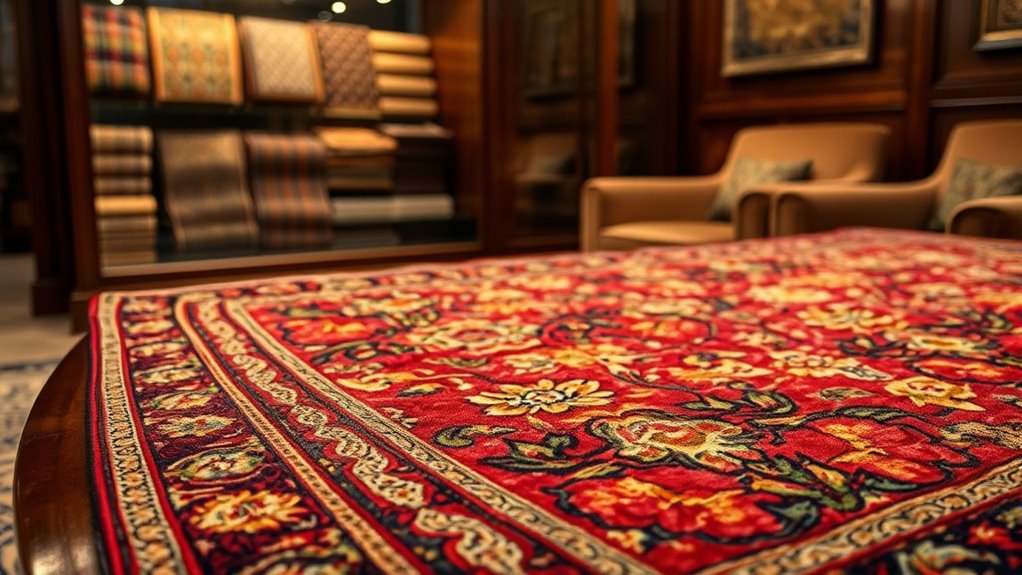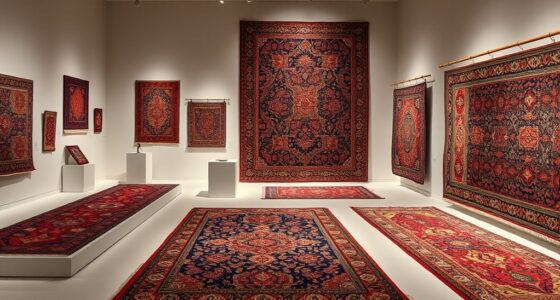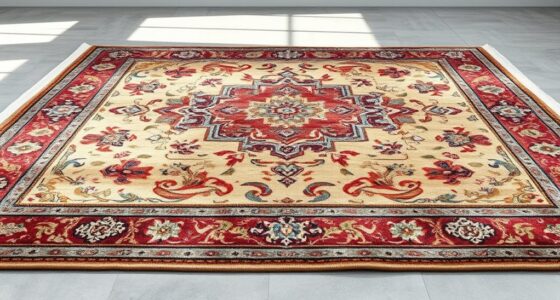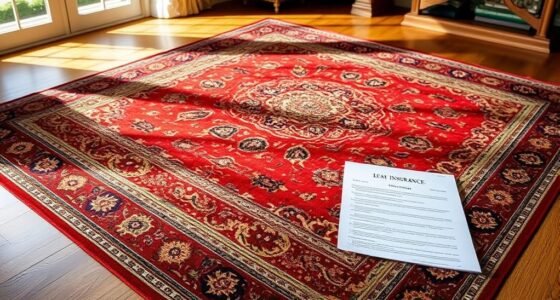When deciding between private sales and auctions for your high-value carpet, consider your desire for control, privacy, and potential price outcomes. Private sales allow tailored negotiations and discreet marketing, ideal for exclusive pieces, while auctions create excitement through bidding, potentially increasing value through competition. Each method has its risks and costs. To choose the best approach for your carpet’s unique qualities, explore the detailed insights ahead.
Key Takeaways
- Private sales offer confidentiality, personalized negotiations, and control over terms, suitable for discreet, high-value carpet transactions.
- Auctions generate competitive bidding, market excitement, and potentially higher prices through urgency and bidder competition.
- Private sales typically involve lower fees and flexible timing, while auctions have fixed dates and include premiums and commissions.
- Auctions attract a broader audience but less qualified buyers, whereas private sales target specific, serious collectors.
- Provenance, rarity, and verification are crucial in both methods to ensure authenticity and maximize sale value.
Understanding the Private Sale Process
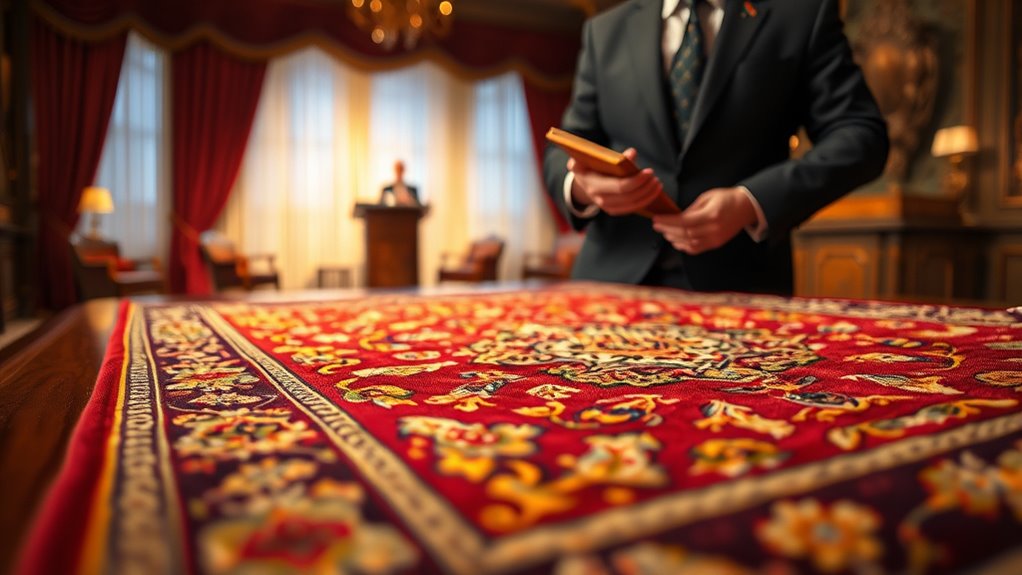
A private sale process involves transferring ownership of an asset directly between a buyer and a seller, often without public advertising or bidding. You can leverage digital marketing to target specific audiences, making the sale more efficient and personalized. By utilizing online platforms, you reach potential buyers discreetly, maintaining confidentiality and exclusivity. Customer testimonials play a pivotal role; positive reviews build trust and validate the quality of your high-value carpets. Sharing authentic experiences reassures buyers that they’re making a secure investment. Unlike public auctions, private sales allow you to negotiate terms directly, giving you more control over the sale. This personalized approach appeals to discerning buyers who value privacy and tailored transactions, making private sales an attractive option for high-value assets. Additionally, understanding the contrast ratio of your carpets can help in accurately showcasing their quality and appeal to prospective buyers. Affiliate disclosures and transparent communication can further enhance buyer confidence in the process.
How Auctions Create Market Excitement

Auctions generate excitement by encouraging competitive bidding, where participants actively outbid each other to win. The limited-time nature of auctions keeps buyers engaged and enthusiastic to act quickly. This sense of urgency fuels energy and anticipation, making the market lively and dynamic. Additionally, market vitality is often enhanced by professional appraisals and curated selections that attract serious collectors. Moreover, the logistics involved in hosting auctions are carefully managed to ensure a seamless experience for participants, further boosting confidence and participation. Implementing strategies to develop a growth mindset can also help auction organizers adapt and innovate, ensuring ongoing success and engagement. Understanding credit card terms can influence how buyers manage their payments and budgets during high-value transactions, adding another layer of strategic engagement to the process.
Competitive Bidding Dynamics
When bidders recognize that their rivals are actively competing, the tension and energy in the auction skyrocket. This dynamic fuels excitement, especially in a market saturated with high-value carpets. As buyer demographics shift, more diverse participants jump into the fray, driving prices higher. The use of visual hierarchy in auction displays helps emphasize key bids and create a more engaging experience. Additionally, the strategic placement of vintage decor elements can evoke a sense of tradition and authenticity that enhances the overall atmosphere. Furthermore, understanding market saturation can help bidders develop more strategic approaches to bidding, maintaining their competitive edge.
- Intense competition sparks adrenaline, motivating bidders to bid higher
- Market saturation encourages strategic bidding, heightening suspense
- Diverse buyer demographics add unpredictability to the bidding process
- Rapid bid increments create a lively, engaging atmosphere
These elements work together to create a sense of urgency and excitement, making auctions more than just sales—they’re high-stakes events where every bid counts. The competitive bidding dynamics keep everyone on their toes, ensuring market excitement remains at its peak.
Limited-Time Engagement
The thrill of limited-time bidding transforms auctions into high-stakes events that keep participants on edge. This compressed sales timeline creates urgency, motivating buyers to act quickly rather than delay decisions. As the clock ticks down, buyer engagement intensifies, fueling competitive spirit and emotional investment. The finite window encourages bidders to evaluate their offers carefully, knowing they must commit before bidding closes. This sense of immediacy not only heightens excitement but also helps to generate momentum that accelerates the overall sales process. Unlike private sales, where negotiations can stretch out, auctions leverage this limited engagement period to create a sense of market energy that draws in more active participants. Additionally, market energy is crucial in encouraging bidders to trust the process and participate actively. The high-performance features of specialized vacuums, such as cyclone technology and advanced filtration, further instill confidence in buyers’ perceptions of value and quality. The time-sensitive nature of auctions amplifies buyer motivation and helps create a vibrant marketplace for high-value carpets. It also taps into buyer psychology, which is essential for understanding how urgency influences decision-making. Ultimately, the time constraint makes every moment count, drawing in more active participants and elevating market energy around high-value carpets.
Privacy and Discretion in Selling High-Value Carpets

When selling high-value carpets, you often need to keep details confidential through negotiation processes that safeguard your privacy. Discreet marketing strategies help you reach serious buyers without exposing your collection publicly. Maintaining discretion ensures your sale stays private and preserves your reputation. Utilizing secure and controlled cookie management practices can also support confidentiality by limiting the exposure of your personal browsing data. Properly managing user consent settings further enhances your privacy, giving you greater control over who accesses your information during the sale process. Additionally, understanding the horsepower of electric dirt bikes can help you evaluate the performance aspects of related equipment used in secure transportation.
Confidential Negotiation Processes
Confidential negotiation processes are essential when it comes to selling high-value carpets, as privacy and discretion can considerably influence the outcome. Engaging in a confidential negotiation guarantees that sensitive details remain protected, fostering trust between you and potential buyers. Discreet transactions help maintain your privacy and prevent market speculation. To succeed, focus on:
- Limiting information shared during negotiations
- Using private channels for communication
- Employing secure, confidential documentation
- Building trusted relationships with select buyers
These steps help create a controlled environment where negotiations stay discreet and your privacy stays intact. Confidential negotiation not only safeguards your interests but also enhances the overall selling experience, making sure that high-value transactions remain private and secure.
Discreet Marketing Strategies
To effectively sell high-value carpets while maintaining privacy, you must implement discreet marketing strategies that prioritize confidentiality at every step. Focus on selective digital branding to showcase your carpets subtly, avoiding broad exposure. Use private online galleries or password-protected websites to display high-quality images, ensuring only serious buyers access details. When leveraging social media, keep posts vague or use direct messaging to target specific clients without publicizing the sale. Avoid public listings that could reveal sensitive information. Instead, emphasize personalized outreach and confidential consultations. This approach helps preserve your client’s privacy and maintains the exclusivity of your high-value carpets. Discreet marketing not only safeguards your reputation but also attracts discerning buyers who appreciate confidentiality and professionalism.
The Role of Provenance and Rarity in Sale Strategy
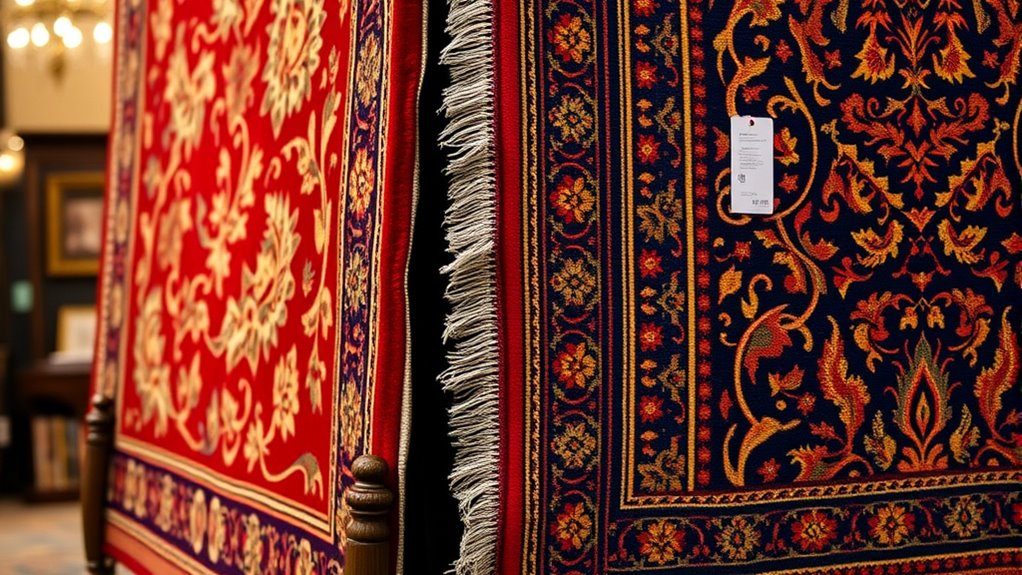
Provenance and rarity are pivotal factors that can substantially influence the success of a sale, whether through private negotiations or auctions. When a carpet has a well-documented history, it highlights its artistic craftsmanship and cultural significance, boosting its appeal. Rarity amplifies this effect, making it a one-of-a-kind collector’s item. You should consider:
- How provenance demonstrates authenticity and enhances value
- The impact of cultural significance on buyer interest
- How rarity can create urgency and exclusivity
- The importance of detailed documentation for high-value carpets
Pricing Strategies: Negotiation vs. Competitive Bidding

When choosing between negotiation and competitive bidding, you gain different levels of control over pricing and flexibility. Bidding creates a lively competition that can drive prices higher, but it also exposes your strategy to others. Understanding how price transparency influences your approach can help you decide which method aligns best with your goals.
Negotiation Flexibility and Control
Negotiation flexibility and control play a significant role in choosing between private sales and auctions. When negotiating privately, you have the opportunity to tailor terms and explore bartering opportunities, giving you more control over the sale process. This approach allows you to address emotional attachment, ensuring you feel comfortable with the final deal. In contrast, auctions limit your control, as bids are often final and driven by competition.
Consider these points:
- You can set your preferred price and negotiate directly
- Flexibility to adjust terms based on buyer feedback
- Ability to manage emotional attachment by choosing when to step back
- Greater control over timing and sale conditions
Ultimately, private sales offer more negotiation freedom, giving you a strategic advantage.
Bidding Competition Dynamics
Bidding competition dynamics considerably influence pricing strategies in private sales and auctions. In auctions, understanding auction tactics like bid escalation is vital, as it drives prices higher through competitive bidding. When multiple bidders engage, the pressure to outbid others can quickly escalate the price, often surpassing initial estimates. This creates a sense of urgency and excitement, encouraging bidders to participate actively. Conversely, in private sales, bidding competition tends to be less intense, allowing more control over the final price. Recognizing how bid escalation occurs in auctions helps you gauge the level of competition and adjust your strategy accordingly. If you aim to maximize value, fostering a competitive environment through auction tactics can greatly boost the final price, whereas private sales offer a more controlled, negotiation-driven process.
Price Transparency and Strategy
Price transparency plays a crucial role in shaping your strategy in private sales and auctions. When you understand market valuation, you can better navigate price fluctuations and set realistic expectations. In private sales, transparency allows for negotiation based on current market conditions, giving you leverage to maximize value. In auctions, limited transparency can lead to unpredictable bidding, driven by perceived value rather than actual market data. Being aware of how price fluctuation impacts your carpet’s worth helps you decide whether to pursue a competitive bidding process or negotiate privately.
- Gauge current market valuation to inform your pricing approach
- Recognize how price fluctuation affects high‑value carpets
- Decide when transparency benefits your sale strategy
- Adjust tactics based on market trends and buyer behavior
Timeframes and Flexibility in Private Sales and Auctions
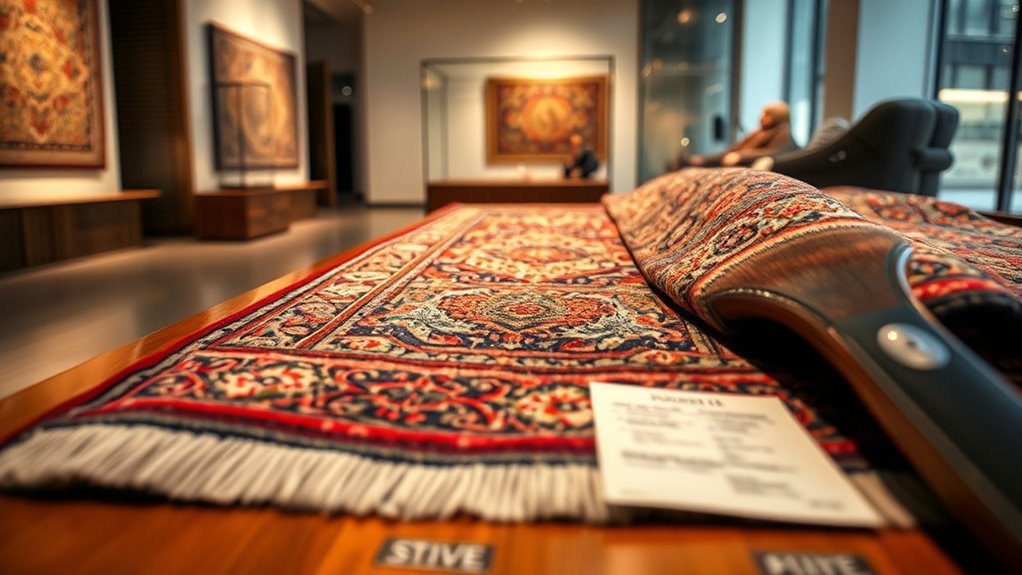
When comparing private sales and auctions, understanding their timeframes and flexibility is essential. With private sales, you have greater control over timing considerations, allowing you to set your own schedule. This flexibility means you can choose when to list your carpet, giving you time to find the right buyer without pressure. Auctions, on the other hand, operate on fixed dates, which can create urgency but limit your seller flexibility. If you’re ready to sell quickly, an auction might suit you, but if you prefer more control over the process, private sales provide more adaptable timing. Ultimately, your choice depends on how much control you want over when and how the sale occurs, balancing your need for speed against your desire for flexibility.
The Costs Involved in Each Selling Method

Both private sales and auctions come with different cost structures that can considerably impact your overall profit. understanding seller expenses is essential before choosing a selling method. in private sales, you often face fewer fees but may pay for marketing or broker commissions. auctions, on the other hand, typically involve higher costs, including seller’s premiums and auction house commissions.
Consider these factors:
- Auction house fees and seller premiums
- Marketing and advertising expenses
- Brokerage commissions in private sales
- Transportation and appraisal costs
These costs directly influence your net profit, so you must weigh the expense implications of each method. carefully evaluating the cost structure helps you choose the most financially advantageous way to sell your high-value carpet.
Reaching the Right Audience: Targeted vs. Broad Exposure
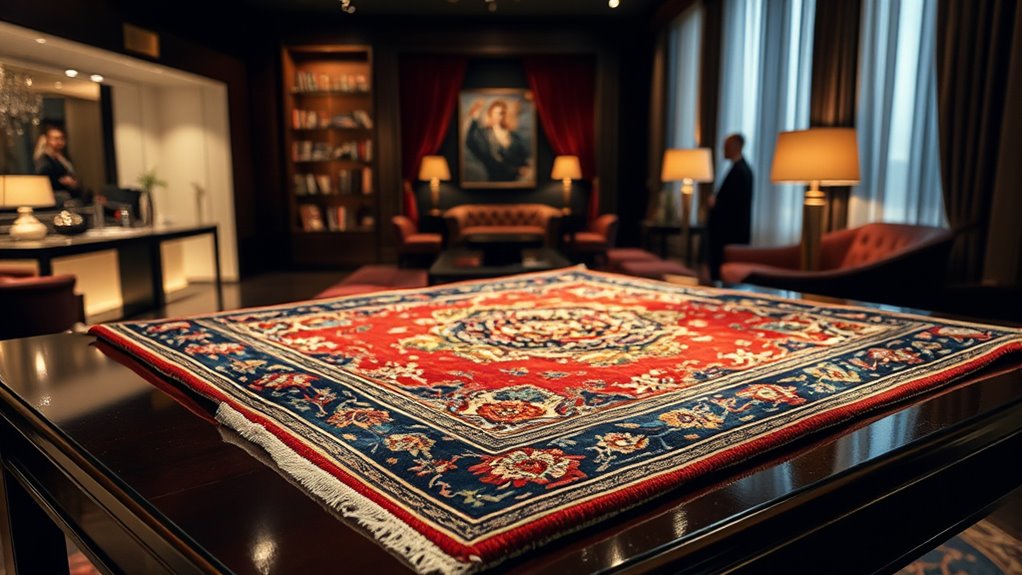
Choosing the right audience is essential when selling a high-value carpet, as it determines how effectively you connect with potential buyers. Targeted exposure through collector networks and luxury branding allows you to reach serious collectors and enthusiasts who appreciate the carpet’s exclusivity. Private sales often utilize these specialized networks, ensuring your piece is seen by individuals with genuine interest and the means to purchase. In contrast, broad exposure, such as public auctions, casts a wider net but may attract less qualified buyers. While broad exposure can generate quick interest, it may not align with your goal of finding the right match for your high-value carpet. Understanding your audience helps you choose the most effective selling method to maximize value.
Assessing the Risks and Rewards of Each Approach

Evaluating the risks and rewards of private sales versus auctions requires a clear understanding of what each method offers and the potential pitfalls. Private sales provide confidentiality and control but may limit exposure in a saturated market, reducing potential offers. Auctions can generate competitive bidding, often leading to higher prices, but they also carry risks like market saturation that can depress prices. Authenticity verification is essential in both approaches to avoid fakes and protect your investment.
Balancing private sales and auctions hinges on market saturation, authenticity, and your desired level of control.
- Private sales offer discretion but might yield lower offers in a crowded market
- Auctions encourage bidding, but market saturation can limit profit potential
- Authenticity verification protects you from counterfeit risks
- Private sales reduce the pressure of quick decisions, whereas auctions demand readiness to act fast
Choosing the Best Method Based on Carpet Characteristics
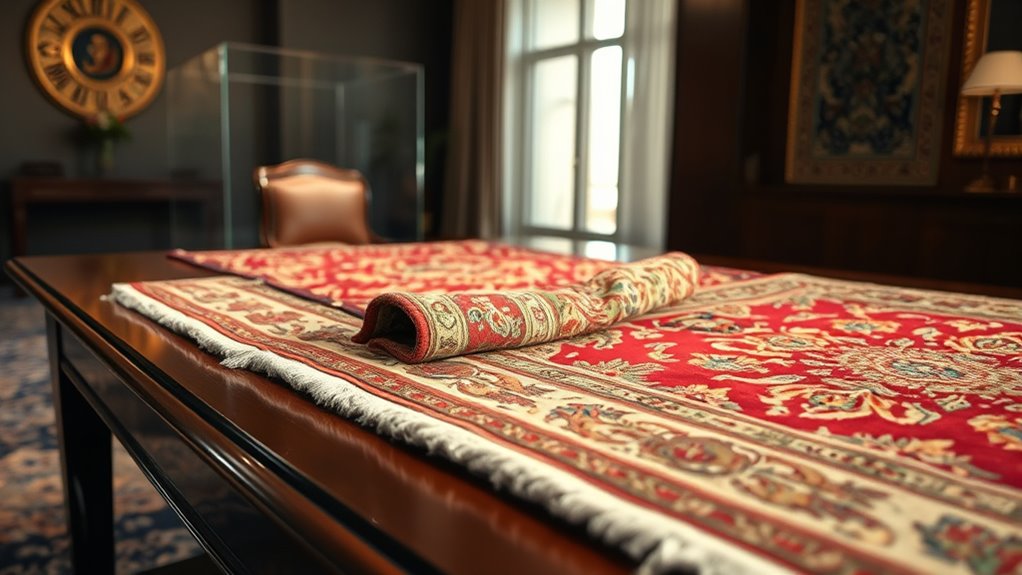
When selecting the best sales method for your carpet, consider its unique characteristics, such as rarity, condition, and market demand. If your carpet has high cultural significance or restoration considerations, an auction can attract passionate collectors who value authenticity. Conversely, if it’s a unique piece with delicate restoration needs, private sales might offer more control and discretion. Use the table below to evaluate your carpet’s traits:
| Characteristic | Recommended Sale Method |
|---|---|
| Cultural Significance | Auctions to reach dedicated collectors |
| Restoration Considerations | Private sales for personalized negotiations |
| Rarity and Demand | Auctions for high-demand pieces |
| Condition | Private sales if restoration affects value |
Matching these attributes ensures you choose the method that maximizes value while respecting your carpet’s unique qualities.
Frequently Asked Questions
How Do Private Sales Affect a Carpet’S Future Market Value?
Private sales can impact a carpet’s future market value by limiting market transparency, making it harder to gauge true demand and pricing trends. You might keep pricing confidentiality, but this can lead to undervaluation or overvaluation, affecting future sales. Without public bidding, the carpet’s value may not reflect current market conditions, so it’s important to contemplate how private transactions influence perception and valuation over time.
What Legal Considerations Are Involved in Private Versus Auction Sales?
When you sell a high-value carpet privately or at auction, legal considerations like contract confidentiality and legal compliance come into play. In private sales, you need clear agreements to protect confidentiality and guarantee both parties follow legal standards. Auctions require adherence to auction laws and regulations, including proper disclosure and registration. Understanding these legal aspects helps safeguard your interests and ensures smooth transactions, whether selling privately or through an auction house.
Can Private Sales Lead to Better Buyer-Seller Relationships?
Private sales can promote personal trust and pave the way for powerful partnerships. You’ll find that direct dealings foster face-to-face communication, giving you opportunities to negotiate tactics and tailor offers. This personalized approach helps build bonds beyond a basic transaction, making it easier to establish lasting relationships. By choosing private sales, you prioritize personal rapport and open dialogue, potentially leading to more meaningful, mutually beneficial buyer-seller bonds.
How Do International Markets Influence Auction Versus Private Sales?
International markets significantly impact your decision between auction and private sales. A global market broadens your reach, allowing you to target high-value buyers worldwide, which can influence your pricing strategies. Auctions attract international collectors enthusiastic for rare carpets, often driving up prices through bidding. Conversely, private sales offer personalized negotiations, giving you more control over pricing and terms. Understanding these influences helps you choose the best approach for maximizing value.
What Are the Environmental Impacts of Each Selling Method?
You might find that both selling methods gently influence the environment, with private sales often allowing for more controlled, sustainable sourcing and pollution reduction. Auctions, however, can generate higher energy consumption due to larger events and transportation. By choosing a method mindful of eco-friendly practices, you help minimize environmental impacts, supporting sustainable sourcing and reducing pollution, ultimately fostering a more responsible approach to high-value carpet sales.
Conclusion
Ultimately, whether you choose a private sale or an auction, think of it as selecting your perfect dance partner—each offers its own rhythm and flair. Private sales glide smoothly through discreet corridors, while auctions ignite the room with a thunderous applause. By understanding your carpet’s story and your goals, you’ll step confidently onto the stage, ensuring your prized possession finds its rightful home—shining brighter than a gem in the spotlight.
